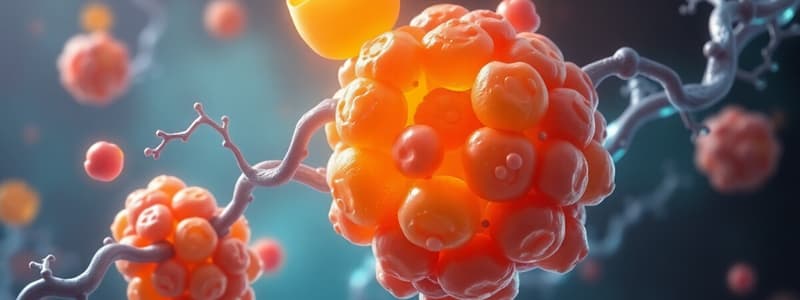Podcast
Questions and Answers
What is the first enzymatic step in the metabolism of fructose?
What is the first enzymatic step in the metabolism of fructose?
- Conversion to glyceraldehyde
- Phosphorylation to fructose 1-phosphate (correct)
- Oxidation to sorbitol
- Conversion to UDP-galactose
A deficiency of which enzyme leads to hereditary fructose intolerance?
A deficiency of which enzyme leads to hereditary fructose intolerance?
- Fructokinase
- Galactokinase
- Aldolase B (correct)
- UDP-hexose 4-epimerase
What major dietary source contributes to galactose levels in the body?
What major dietary source contributes to galactose levels in the body?
- Sucrose
- Lactose (correct)
- Fructose
- Starch
What is produced from sorbitol in the presence of sorbitol dehydrogenase?
What is produced from sorbitol in the presence of sorbitol dehydrogenase?
What condition results from a deficiency of galactose 1-phosphate uridyltransferase (GALT)?
What condition results from a deficiency of galactose 1-phosphate uridyltransferase (GALT)?
Which metabolic pathway does UDP-galactose enter before becoming UDP-glucose?
Which metabolic pathway does UDP-galactose enter before becoming UDP-glucose?
What complication can arise from excessive sorbitol accumulation in cells lacking sorbitol dehydrogenase?
What complication can arise from excessive sorbitol accumulation in cells lacking sorbitol dehydrogenase?
What enzyme is responsible for phosphorylating mannose to mannose 6-phosphate?
What enzyme is responsible for phosphorylating mannose to mannose 6-phosphate?
What two monosaccharides make up lactose?
What two monosaccharides make up lactose?
Which enzyme synthesizes lactose in the lactating mammary gland?
Which enzyme synthesizes lactose in the lactating mammary gland?
Why can a nursing female with classic galactosemia still produce lactose?
Why can a nursing female with classic galactosemia still produce lactose?
What symptoms might suggest hereditary fructose intolerance?
What symptoms might suggest hereditary fructose intolerance?
How is α-lactalbumin involved in lactose synthesis?
How is α-lactalbumin involved in lactose synthesis?
What is the most likely deficiency in a 3-month-old girl with cataracts and reducing sugar in her urine?
What is the most likely deficiency in a 3-month-old girl with cataracts and reducing sugar in her urine?
What is the effect of a deficiency in β-galactosidase?
What is the effect of a deficiency in β-galactosidase?
The synthesis of UDP-galactose involves which of the following enzymes?
The synthesis of UDP-galactose involves which of the following enzymes?
What hormone stimulates the synthesis of α-lactalbumin in the lactating mammary gland?
What hormone stimulates the synthesis of α-lactalbumin in the lactating mammary gland?
Flashcards are hidden until you start studying
Study Notes
Fructose Metabolism
- Sucrose is a primary source of fructose; hydrolysis yields equal amounts of fructose and glucose.
- Fructose transport into cells is insulin-independent.
- Initial phosphorylation of fructose to fructose 1-phosphate occurs via fructokinase; further cleavage is done by aldolase B.
- Key tissues involved in fructose metabolism: liver, kidney, small intestinal mucosa.
- Fructokinase deficiency leads to essential fructosuria, a benign condition.
- Aldolase B deficiency results in hereditary fructose intolerance (HFI), causing hypoglycemia and liver failure if fructose and sucrose are ingested.
Mannose and Sorbitol Metabolism
- Mannose is phosphorylated by hexokinase to mannose 6-phosphate, convertible to fructose 6-phosphate by phosphomannose isomerase.
- Aldose reductase reduces glucose to sorbitol in various tissues; sorbitol can then be oxidized to fructose by sorbitol dehydrogenase in liver, ovaries, and seminal vesicles.
- Hyperglycemia can lead to excessive sorbitol accumulation in cells lacking sorbitol dehydrogenase, causing osmotic cell swelling, cataracts, and neuropathy.
Galactose Metabolism
- Lactose, major dietary source of galactose, is composed of glucose and galactose.
- Galactose transport into cells is also insulin-independent.
- Galactokinase phosphorylates galactose to galactose 1-phosphate; a deficiency can lead to cataract formation.
- Galactose 1-phosphate is converted to UDP-galactose via galactose 1-phosphate uridyltransferase (GALT); GALT deficiency results in classic galactosemia.
- Accumulated galactose can convert to galactitol by aldose reductase, leading to liver damage, intellectual disability, and cataracts.
Lactose Synthesis
- Lactose is synthesized in the mammary gland from UDP-galactose and glucose by lactose synthase, which has two subunits: protein A (galactosyltransferase) and protein B (α-lactalbumin).
- α-lactalbumin expression is stimulated by prolactin, enhancing lactose production.
Clinical Cases
- Classic Galactosemia: Infants with this condition can produce lactose due to conversion from UDP-glucose to UDP-galactose via UDP-hexose 4-epimerase.
- Hereditary Fructose Intolerance: Symptoms include vomiting and hepatomegaly after fruit juice introduction due to aldolase B deficiency.
- Cataract Development: A galactokinase deficiency in infants leads to cataracts from galactose accumulation; aldose reductase activity converts excess galactose to galactitol in lens cells.
Key Enzymes
- Fructokinase: Phosphorylates fructose.
- Aldolase B: Cleaves fructose 1-phosphate.
- Hexokinase: Converts mannose and galactose.
- Aldose Reductase: Converts glucose to sorbitol.
- Sorbitol Dehydrogenase: Converts sorbitol to fructose.
- Galactose 1-phosphate Uridyltransferase (GALT): Converts galactose 1-phosphate to UDP-galactose.
Studying That Suits You
Use AI to generate personalized quizzes and flashcards to suit your learning preferences.




